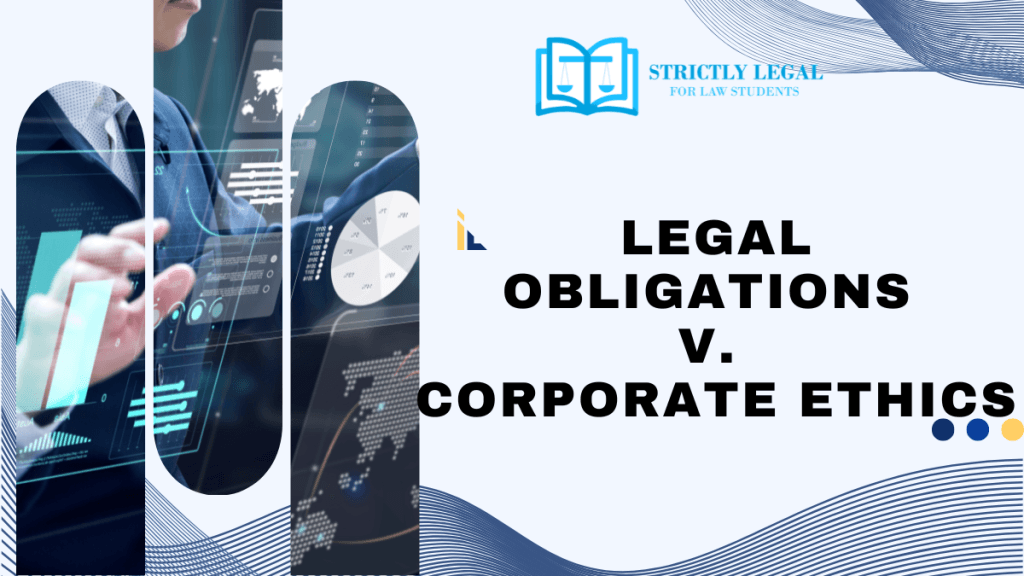In today’s fast-paced global business environment, corporations are expected not only to comply with legal regulations but also to adhere to ethical standards that promote social responsibility and sustainability. The tension between legal obligations and corporate ethics is a topic of significant debate. While the law provides a baseline of acceptable conduct, ethics often demands a higher standard—one that considers long-term societal impact and the broader moral responsibilities businesses have to their stakeholders. This article explores the complexities and challenges businesses face when navigating legal requirements alongside ethical considerations.
In today’s fast-paced global business environment, corporations are expected not only to comply with legal regulations but also to adhere to ethical standards that promote social responsibility and sustainability. The tension between legal obligations and corporate ethics is a topic of significant debate. While the law provides a baseline of acceptable conduct, ethics often demands a higher standard—one that considers long-term societal impact and the broader moral responsibilities businesses have to their stakeholders. This article explores the complexities and challenges businesses face when navigating legal requirements alongside ethical considerations. Legal obligations refer to the set of rules, statutes, and regulations that businesses must follow to operate within the law. These are often clear, codified in statutes, and enforced by governmental agencies or regulatory bodies.
Table of Contents
Corporate Ethics: The Voluntary Compass
In contrast, corporate ethics refers to the moral principles, values, and standards that guide a company’s behavior. Unlike legal obligations, corporate ethics are voluntary and typically arise from a company’s leadership, culture, and industry expectations. These ethical guidelines are intended to shape behavior in ways that go beyond mere legal compliance, addressing issues that may not be covered by law but are crucial for responsible business conduct.
Corporate ethics are essential in building a reputation as a trustworthy and responsible organization, which can lead to customer loyalty, employee satisfaction, and long-term profitability. However, because ethics are not legally enforced, the decision to adopt and uphold these principles ultimately lies with the company’s leadership.
- Fair treatment of employees: This goes beyond legal requirements, focusing on workplace inclusivity, equal opportunity, and respect for diversity.
- Transparency and honesty: Companies often choose to disclose more information than required by law, fostering trust with customers, investors, and employees.
- Environmental responsibility: Going beyond compliance with environmental laws by adopting sustainable practices such as reducing carbon footprints, using renewable energy, or adopting circular economy principles.
- Social responsibility: Supporting charitable causes, community involvement, or ethical sourcing of materials, even if these actions are not legally mandated.
Legal Obligations and Corporate Ethics: Relationship
At their core, legal obligations and corporate ethics aim to guide business behavior, but they differ in most subtle ways.
Mandatory vs. Voluntary: Legal obligations are enforceable by law and must be followed, while corporate ethics are driven by internal motivations and values.
Focus on Compliance vs. Morality: Legal obligations often focus on ensuring minimum standards of behavior (e.g., safety regulations, non-discrimination laws), whereas corporate ethics often focus on doing the right thing even in situations where the law is silent or insufficient.
Profit v. Ethics: The Tension
A significant challenge for businesses is balancing profit maximization with ethical principles. There are situations where legal obligations may allow a company to act in ways that some may perceive as unethical. For example, a company may legally minimize its tax burden by using offshore tax havens, even if this is seen as exploiting loopholes.
Similarly, in the pursuit of profitability, a company may follow the law but take actions that harm its reputation. For example, a company might exploit workers in developing countries or engage in misleading advertising that technically adheres to the law but is deemed unethical.
Conversely, a company that chooses to prioritize ethics over profits may face higher operational costs. Ethical sourcing of materials or adopting more sustainable practices often requires an upfront investment, which can reduce short-term profits. However, the long-term benefits—such as brand loyalty, customer trust, and employee morale—can outweigh these initial costs.
Importance of Ethical Leadership
Ethical leadership plays a crucial role in bridging the gap between legal obligations and corporate ethics. Strong ethical leadership sets the tone for the organization, guiding employees and stakeholders in making decisions that align with both legal and moral expectations. Leadership that emphasizes integrity, fairness, and responsibility helps to create a culture that values ethical behavior alongside compliance with legal requirements.
Stiving for Both
While legal obligations are essential for regulating business activities and protecting society, corporate ethics add an additional layer of responsibility that can foster trust, loyalty, and long-term success. Businesses that can integrate ethical practices with legal compliance will be better positioned to thrive in an increasingly complex and competitive world.
Ultimately, the goal should be for companies to not just meet legal requirements but also exceed them through ethical actions that benefit not only their bottom line but also society at large. By aligning legal obligations with corporate ethics, businesses can ensure that they do the right thing while achieving sustainable growth and maintaining a positive reputation.

Law student.
Turning legal insights into engaging narratives.





